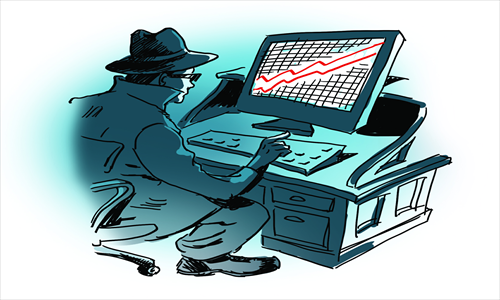Hacking fantasies excuse for US failings

The US media has been working up a storm over Chinese online espionage recently. A whiter-than-snow US is subject to a red onslaught of hacking from China.
Furthermore, according to US Congressional Committee enquiries, China's two largest telecommunications manufacturers, Huawei and ZTE, are riddled with security risks so US companies must forego the advantages of their lower prices and purchase more expensive equipment from US companies and their close allies.
Bloomberg Businessweek even suggested this cyber onslaught is why China's economy is growing more rapidly than the US. In a recent issue, with a sensational front cover headline "Yes, the Chinese army is spying on you," Dell SecureWorks' Joe Stewart concluded: "Seeing the US economy go south, high unemployment and all these great companies being hit by China … I just don't like that. If they did it fair and square, more power to them. But to cheat at it is wrong."
This is enough to keep little children awake at night with worry. Except this is what this is, stories for little children.
The actual situation in cyberspace is the reverse, as an examination of the facts shows.
The US possesses by far the world's most advanced computer technologies. Despite China's economic performance, it doesn't yet match the US in this.
The real situation in cyber espionage is revealed by the world's most clearly identified cyber attack: the Stuxnet computer virus that the US developed with Israel. This is a company-specific attack virus targeting specific pieces of Siemens equipment.
Stuxnet was aimed at Iran's nuclear program. But once released in cyberspace it was discovered because it couldn't be fully contained. Only 59 percent of infected computers were Iranian, 18 percent Indonesian, 8 percent Indian, and 13 percent in other countries. This hacking attack was accompanied by targeted assassinations of scientists, something even Bloomberg hasn't accused China of.
US security services have certainly minutely examined and tested Huawei and ZTE equipment. There is nothing wrong with this, it is legitimate security service activity and equally certain China's security services have investigated and tested US telecommunications equipment.
It is certain the US security services, possessing more powerful facilities than any commercial organization, found no problem, as if they had one single authenticated piece of evidence to release this would destroy Huawei or ZTE, to their US competitors advantage.
Other attacks on China are similarly infantile. Reuters recently published "sensational revelations" that staff from the Shanghai Jiao Tong University had collaborated on papers with PLA members; the secretive character of this being demonstrated by authors' names appearing in academic journals!
Shanghai Jiao Tong is a top Chinese engineering university, so naturally it has some contacts with military R&D, just as the world's single biggest R&D budget, the US military one, involves cooperation with US universities. Only technical experts can evaluate all claims of hacking attacks on US sites.
Many published ones are unconvincing, and have been denied by China, as in cyberspace, it is easy to create the impression that activity originates in one country when actually it comes from another.
Equally only technical experts can evaluate China's claims that in 2012 its military sites faced 95,000 cyber attacks per month originating in the US, or that 1.3 million computers in China were infected so as to be controlled from the US.
But given the overwhelming predominance of the US in computer technology, and the part of its cyber-attack activities which are visible, it is certain that computer attacks on China originating in the US are far greater in number than those on the US originating in China.
Unfortunately for Bloomberg, the prosaic truth is China's economy grows more rapidly than the US not because of cyber spying but because China invests more and has a better macroeconomic system.
The author is a senior fellow of the Chongyang Institute for Financial Studies, Renmin University of China. opinion@globaltimes.com.cn